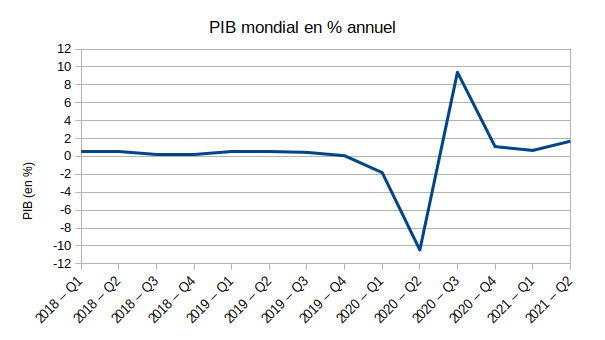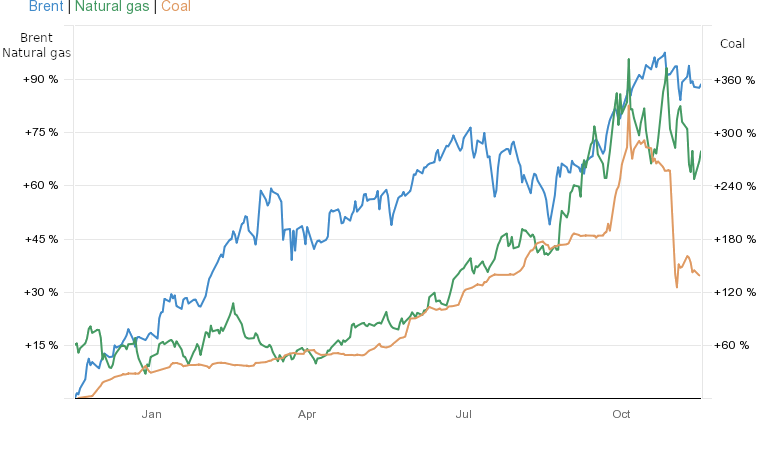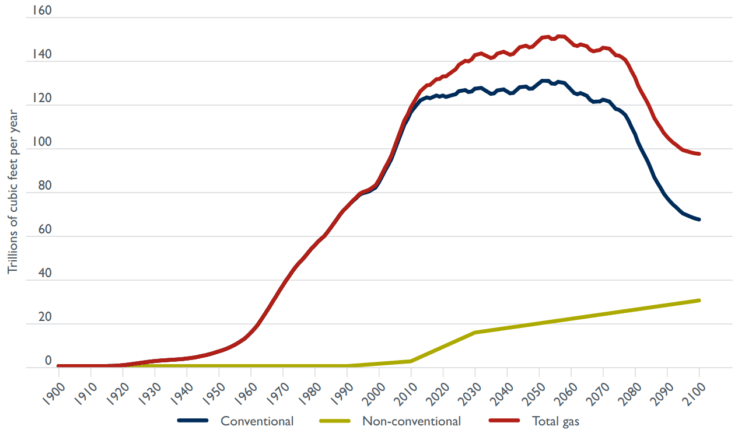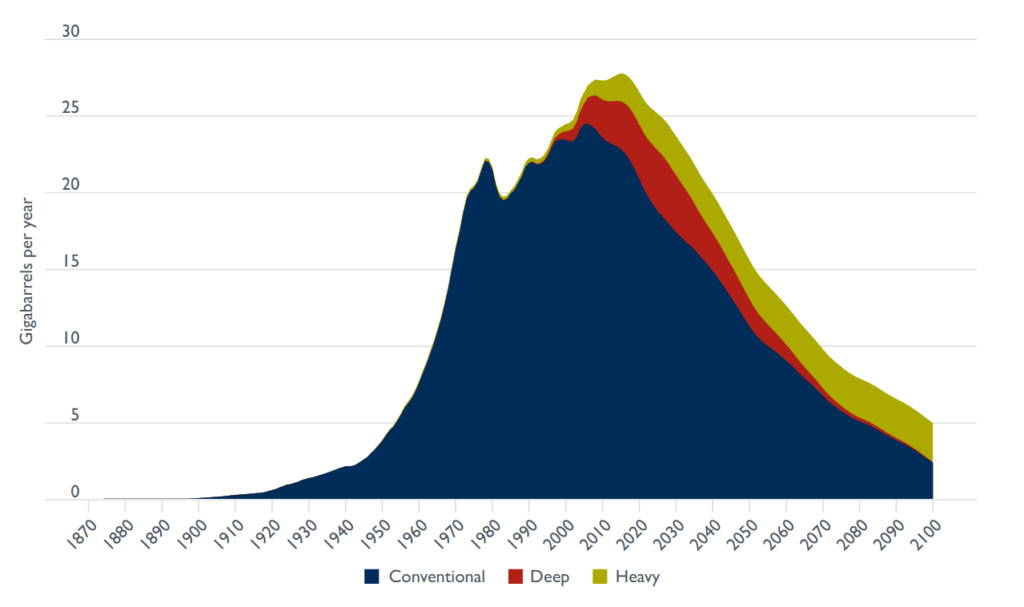By Gauthier Hordel, via La Riposte
The Covid crisis that began in March 2020 has plunged the global economy into recession. Restrictive measures to stem the spread of the virus have contributed to the slowdown in global production. During this period, households consumed less and in fact saved. The situation of the most precarious has worsened. The restarting of the capitalist productive machine, massively supported by public funds, restarted very strongly at the end of 2020, but in reality only partially made up for the delay accumulated during this “transitional” phase in an economy already in stagnation.

Figure 1: Evolution of global GDP ( Source: Databank
The year 2021 is marked by a sharp increase in energy prices. This situation results from several factors. When the noose of containment measures loosened, the productive machine started up again along with an increase in consumption and demand. Industrial activity has accelerated. In order to produce goods, industries need energy (electricity, oil, gas, etc.). Without energy, there can be no production. Energy needs then took off in order to allow production to meet the increase in demand, thus making it possible to revive the economy and regain points of GDP. The resumption of domestic growth is essential for preserving the economic power of States. The demand for energy then exploded, exceeding production capacities.
China, which consumes a lot of energy to supply the whole world with finished or intermediate goods, has had to face electricity shortages, forcing the government to ration its distribution, in particular by imposing one-off cuts. To alleviate this shortage, the government had to revive coal-fired power stations and reopen mines in order to produce the electricity needed for its industry. The same is true for natural gas. Overall, given the tight energy supply situation, the States are trying to build up stocks to meet domestic demand and ensure a level of production capable of supporting the “resumption” of growth. At the same time, the gas operations suffered operational maintenance problems due to the shortage of equipment as a result of the lockdown period. States found themselves in competition, in particular between the European Union and China for the supply of gas. The liberalized energy market does not escape the laws of capitalism which generate price volatility and encourage speculative operations.

Russia is the second largest gas producer in the world. In recent years, it alone has supplied 40% of European consumption. The Russian company Gazprom is in a position to maintain supply pressure and destabilize the gas market, thereby promoting price inflation. The energy crisis is being felt at all levels. First of all, it increases the price of energy consumption, both for households and for businesses. In France, gas prices have jumped several times: 10% in July and 12.6% in October. The mechanisms for setting the price of electricity are linked to those of gas and therefore the price of electricity has also increased. Inexorably, production costs increase for companies until they reach a level where production risks being profitable only through an increase in prices.
According to INSEE, price inflation in October was 2.6% for France. Energy prices contribute to this inflation. As long as this situation persists, the inflationary share linked to energy will only increase and translate into a decrease in the purchasing power of households, undermining demand and slowing growth. Although the mainstream media, pointing to the labour shortage in certain sectors and the fall in unemployment, trumpet that the current economic situation has not been so favourable for a long time, the figures reveal a completely different situation. Global growth has almost returned to its pre-Covid level, i.e. a situation of economic stagnation. We are entering a situation of stagflation, that is, weak growth accompanied by price inflation. All workers, and especially the most precarious, will suffer the consequences.
The energy bottleneck
The level of development of our society is based on the amount of energy available and consumed. Labour productivity is improved thanks to technical progress, but it also means greater consumption of energy. It is fossil fuels (coal, gas and oil) that have largely contributed to the level of development that we are currently experiencing, to the point that we are totally dependent on it. They represent 84% of the total energy consumed.
This is the reason why the pressure is so great on the energy market, because the economic power of a country depends on its access to energy resources. However, it turns out that the latest projections on the production of fossil fuels indicate that it would have reached or would be close to reaching a level where more or less easily extractable reserves are dwindling. Geological knowledge and the means of measurement and location make it possible to have increasingly reliable projections. There are known reserves located in areas that are difficult to access and not exploited because they require excessive extraction efforts. This means that exploiting them would imply little or unprofitable investments in relation to the market price of energy.


Figures 3 and 4 are estimates of gas and oil production based on our current knowledge of reserves. They take into account the average annual energy consumption and their changes. Depending on the economic circumstances, for example a deep economic slowdown during the Covid crisis, the peak of production may be shifted over time, but the general shape of the curves remains unchanged. The projections also take into account the cost and profitability of extraction, that is to say the price of energy. If the deposit is not profitable, it is not exploited.
Under capitalism, and it cannot be otherwise, investment is subject to profitability. It is impossible to reorient the production of companies on criteria other than profitability and profit. All those who claim to impose a reorientation of production without questioning capitalist property are either liars or ignorant, or a bit of both.
So why are companies starting to take an interest in technologies that are less dependent on fossil fuels? Apart from the fact that antipollution laws are getting tougher for example in the automotive sector, at one point or another the reserves will be exhausted and the technologies based on fossil fuels will become obsolete. Businesses will then have to find new outlets. The problems of greenhouse gases and global warming are not sufficient motivations to push capitalist companies to reorient their strategies. However, the situation requires radical measures to be taken to limit global warming and disruption. This means, among other things, to invest heavily in research and development. However, the low profitability of investments imposes or will necessarily impose a slowdown in research and development for a technological transformation of the productive system. The strategy deployed by companies is limited to that of greenwashing in order to better lull public opinion to their dramatic inaction.
There are no serious candidates to replace oil. Transportation is 95% dependent on it. When we reach a critical point in the downturn in oil production, there will inevitably be a decline in labour productivity. In other words, world production will begin to descend. This undermines the supporters of green growth.
When the economic interests of multinationals and states are threatened, the climate issue becomes anecdotal. In complete contradiction with the need to use fossil fuels, China has relaunched coal-fired power stations, which is the most polluting resource in terms of CO2 emissions . COP 26 and the climate change conferences that will follow will not change anything in the matter. Electric energy alone cannot replace the reduction in gas and oil even though it is produced from coal (two-thirds of the world’s electric energy is produced from coal). Obviously, electric power will take an increasingly important place and if it continues to be produced from coal, limiting global warming to 2 ° C above pre-industrial levels by 2100 will be nothing but wishful thinking.
Consequences and solutions?
The increase in energy demand will come up against the decrease in fossil fuel reserves. Inevitably, energy prices will undergo constant increases subsequently affecting all world production. For the reasons explained above, we must expect even more profound social and economic destabilization. Conflicts between states for the control of resources will be even more bitter. Social regression has already been imposed for a long time because of a decrease in the profitability of capital. Capitalist society is organized into social classes and governments work, come what may, in the interests of the capitalists to the detriment of other classes and in particular of wage workers.
The Yellow Vest movement emerged in particular against the rise in fuel prices. It therefore seems unavoidable that other movements of the same type will emerge in the years to come. It is with full knowledge of the facts that governments are implementing increasingly authoritarian policies, as if to better guard against probable social explosions. As long as capitalism reigns, it will be impossible to manage the energy problem rationally and it will be subject to extreme speculation. The transition to a period when there will be a reduction in the availability of fossil fuels will be brutal. We should now tend towards energy sobriety. The conversion of the productive system should be planned to cope not only with the decrease in reserves, but also so that human activity has the least possible negative impact on the planet and limit global warming. The survival of humanity is at stake. Businesses, subject to the laws of profitability, cannot achieve these goals as long as they are in the hands of the capitalists. This means that they must be expropriated and put in the public domain, under the democratic control of the workers. If a Yellow Vest type movement emerges in the years to come, demands will have to take this pressing need into account. Taking the road to socialism is the best way to initiate the essential energy transition.
This article from Gauthier Hordel was originally published in La Riposte. The original can be found here.



